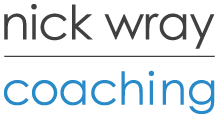BLOG
Barely a day passes without a newspaper article or a well-meaning Linkedin post haranguing me to adopt a new ‘productivity’ technique, process or app. ‘Work better, faster, smarter..!’, the world hollers at me, ever more insistently. “How can I…?” I answer, “I’m too busy reading all these productivity tips…”
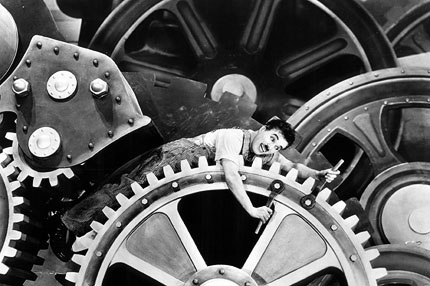
The more things change, the more they stay the same? Charlie Chaplin from ‘Modern Times’ (1936) – nearly 80 years ago.
I am not – I am the first to admit – an organised person. It is also true that there is much of value, and a great deal I have learned (albeit late in life), from the likes of David Allen’s concise ‘Getting Things Done‘, as well as more recent titles like Graham Allcott’s encyclopaedic and excellent ‘How to be a Productivity Ninja‘ – even though I’m not sure if it’s seemly for a man of my age to even consider donning black and squeezing into the role of ‘ninja’.
‘Do difficult tasks first’; break big projects down into little 20 minute ones’, the intriguingly named Pomodorro Technique whispers from its cheeky red tomato registered imagery; work away from your desk, switch off email alerts, hide your phone… Heaven knows, I have friends who don’t even do that at dinner or drinks out, any more (you know who you are…!). So all good stuff.
Yet, it sometimes feels all this is less advice than a demand to conform. A sort of boot camp mentality around ‘great’ performance, in which we must all be our own sergeant major forever bellowing “…now you ‘orrible people, drop everything and — wait for it, wait for it — by the right, be mindful…NOW!”
We hear all the time about new techniques, another model, another process or heuristic for apparently Nirvana-like work-life balance. Indeed, there’s probably a lifetime’s toil in just documenting all this advice, however useful and sensible some of it may be.
Clearly, there are certainly many times during a day (a career or even life) when identifying issues like prioritisation, procrastination, and using the appropriate time-management tools and techniques can be invaluable.
I, for example, multi-task less rather than more than I used to. No, not because I am a man, but because I’ve come to believe it’s simply less efficient to juggle too much, if and when I can avoid it. Not least in a world where managing distractions — because of digital, and the nature of distributed projects — means our ‘focus’ is forever being pecked at:
“No, I don’t want to update Adobe Acrobat”, I think as I try and remember what it was I was about to Google, between completing a scintillating document in my Word file and taking a sneaky peak on Facebook…
No, ‘multi-tasking’ isn’t always helpful. I also try to make use of diaries, to-do lists — and to take breaks — much more than I used to, too.
However, there may also be times when ‘productivity techniques’ simply miss the point. Some people are simply doing too much. In which case, it’s not just a case of individuals ‘prioritising’ or working ‘smarter’, but of them recognising the impossibility of what faces them, and then working out how they need to address this. This goes beyond productivity, into issues like influence, delegation, planning and strategy.
For others, they may be doing the ‘wrong thing’ in a greater sense. The wrong job, or be on the wrong track for them, but they are simply too busy to realise it. If so, then this is not an issue of productivity ‘task management’. It is about our self-awareness and relationship with our own jobs. We are more than pieces of ‘clip art’ pulling frustrated faces at the office, looking for a immediate fixes for our work headaches.

“Have you tried the Pomodoro Technique? God, don’t bite my head off – I was just trying to be helpful…” (images from Google Search)
Productivity ‘yes’ but, as they say ‘other [career] choices are available…’
At its best ‘productivity’ allows us to do more in terms of things we need to do, enjoy or even love. Short-term you may want — and need — to do something about being ‘overwhelmed’ or needing to be more ‘efficient’ in terms of where you currently are. You may even want to read some good productivity books.
But if you’re not doing the right thing, or not doing what you want in your career — or perhaps in life itself — ‘productivity’ will never be a sufficient on its own. If so, what is the solution, for you?
It’s the kind of question that coaching can and should help you ask. It’s what coaching offers — above and beyond pure ‘productivity techniques; an opportunity for you to raise your own awareness of where are, and what you want to achieve beyond ‘tasks’. To check-in with yourself and make sure you’re doing the right thing with your life. If you’re not, then does it really matter whether you’re doing it productively (or not!)?
Interested in finding out more about coaching and what’s next for you? Then call me or drop me a line, here.
This week Nick Wray is mainly wearing black…

VW’s tarnished image?
I was reading “First-Time Managers, Don’t Do Your Team’s Work for Them“, a short piece in the online Harvard Business Review (HBR), against a background of today’s lunchtime BBC News, revealing more on the Volkswagen (VW) diesel emissions scandal, affecting millions of cars and customers in the US and Europe.
The HBR piece is about how coaching can help new managers establish boundaries within – and between – teams. And, just as importantly, how managers should consider setting limits on their own expectations of themselves as individuals: ‘Be perfect’, ‘please everyone’? Sound familiar?

Would the Beasties still have chosen VW if they were around today?
Together, this started me wondering: what forces and influences were acting on those individuals involved in the VW story to shape their thinking and behaviour? What made them commit – as currently appears likely — a fraud affecting not just countless owners (the very ‘customers’ of VW), but potentially every VW employee and shareholder, too? What made them do something which, environmentally, will literally effect everyone on earth — including the perpetrators. The Guardian reports the affected VW vehicles may produce up to 40 times more toxic emissions than permitted. What would motivate a deliberate act (assuming absence of industrial espionage or malice) from within the world’s largest car maker by volume, affecting 11 million vehicles and their owners which — ultimately — was almost, surely, bound to be discovered?
The answer to these questions is unlikely to be simple, but it may involve individuals trying to ‘help’ (however distorted their thinking and however much cognitive dissonance was going on) to generate sales and ‘success’ for the organisation. It may also, and I hesitate to use the phrase, reflect on some individuals who decided to simply ‘follow orders’?
It would be trite to position ‘coaching’ in this context as a panacea or means to have avoided this issue; it’s unlikely to be as simple as that and there are clearly organisational and cultural issues involved, too. Not least, why the impressive-looking VW board didn’t know what was happening?; and if they did know what was going on, why they didn’t act sooner?
Indeed, you could argue that coaching would not have made a difference, or made it worse? If someone had decided “where they wanted to go”, “what they wanted to do” (mislead testers on the true level of emissions results in this case) a coach might just have helped them plan this better, surely?!
Yet a professional coach — by testing assumptions and asking challenging questions at the right point — can mitigate against the kind of wood-for-the-trees perspective that at, some level, appears to have happened at VW, which currently faces a potential loss of up to an astonishing $18bn in fines. Simple questions like:
“Are there any alternatives?”
“What might happen?”
“What would good look like?”
Questions that an individual might take away from a general coaching session and keep in their back pocket for future thinking. Questions which might just help avoid the kind of tunnel vision, which — for VW — seems to have led to what is known in the aviation industry as ‘controlled flight into terrain‘.
Audi, part of the VW Group, advertised for many years under the slogan: “Vorsprung durch Technik” — which loosely translates as “Advancement with Technology”. In US advertising Audi substituted a phrase in English:
“Truth in Engineering”
Clearly something has gone wrong in terms of both organisational culture and individual behaviour if “Truth in Engineering” was really VW’s goal?
Nick Wray currently drives a VW Passat…
If you’re interested in finding out more about coaching and what’s next? for you, call me or drop me a line, here.
If you’re interested in organisational leadership, culture, thinking, and change then contact my partner organisation Lift Consultancy via their website, here.
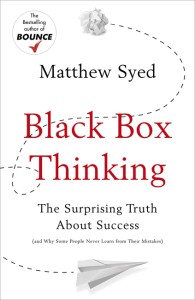 Coaching can help you achieve stretching goals. Yet you don’t always have to make a single massive change in order to do so.
Coaching can help you achieve stretching goals. Yet you don’t always have to make a single massive change in order to do so.
The principle of marginal gains is an approach to change which works by making small, incremental improvements which –collectively — add up to something significant. A theme explored in Times’ journalist Matthew Syed’s excellent new book ‘Black Box Thinking: the surprising truth about success.’
For example, British Cycling team coach Dave Brailsford set a target of a one per cent increase in performance across a variety of areas. Brailsford asked: “Can we make our bikes, helmets, clothes etc, each 1% more aerodynamic?”. Even if a gain is small (the principle of marginal gains argues), each adds up, overall, so that if your bike, helmet and clothes are each 1% less ‘draggy, then a rider (or team) will be 3% more efficient – aerodynamically – than it was before. So there’s a collective benefit of each small improvement on performance.
Do the same across nutrition, training, psychology, you name it, and it all adds up to significant improvement in overall performance, which can help you achieve your goal.
Not quite ‘slowly, slowly catchy monkey…’ (an annoying phrase sometimes used in my experience by managers to justify avoidance of progressing change), but an illustration, none the less, that small differences can add up to something really big and important, if you have an end goal in sight.

‘Competitive Eater’ Takeru Kobayashi
In the case of the British Cycling team, the pay off was Olympic Gold Medals. Takeru Kobayashi‘s aim, on the other hand, was to use marginal gains to optimise his hot dog eating technique (no really… there’s more here if you’re interested!) which allowed him to win Nathan’s Hot Dog Eating Contest in New York… Well remember, It’s your goal and — what’s important to you — that matters in coaching!
Equally, by analysing ‘failure’ individuals (and organisations) can use such learning as an incremental means to chart a future path to success. By asking questions like:
“Which bits of that project went wrong?”
“What could we do to make a difference next time?”
The best software developer I know when asked “Why should we hire you?” says “experience of working on many failed projects…”
So whether it’s a Hot Dog eating competition, an Olympic Gold medal or a glittering prize of importance solely to you, remember you can still define a stretching goal, but there may well be lots of small ways, of little changes, you can discover, and which you can make — and take — to get there.
Want to discuss what’s next for you? Then drop me a line, here.
There’s more on Matthew Syed’s ‘ Black Box Thinking’ here
There’s also a potted version of elements of Matthew’s book on the BBC News website here too.
Rod Judkins’ ‘The Art of Creative Thinking’, published in April, looks at how innovative thinking can be encouraged – and applied – across a variety of different occupations.
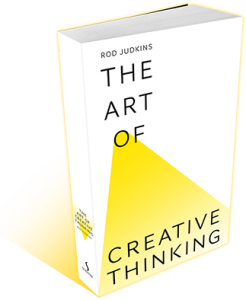 Writing in this week’s Psychology Today, Judkins – a lecturer at Central St Martins and the Royal College of Art describes the impact of conditions such as ADHD (Attention Deficit Hyperactivity Disorder) on students. Clearly ADHD can pose difficulties and present challenges for individuals. But individuals with ADHD, and those who think differently from the ‘norm’, can be just as creative and successful as others. ADHD is not ‘essential’ for creativity, but it does not preclude it.
Writing in this week’s Psychology Today, Judkins – a lecturer at Central St Martins and the Royal College of Art describes the impact of conditions such as ADHD (Attention Deficit Hyperactivity Disorder) on students. Clearly ADHD can pose difficulties and present challenges for individuals. But individuals with ADHD, and those who think differently from the ‘norm’, can be just as creative and successful as others. ADHD is not ‘essential’ for creativity, but it does not preclude it.
Indeed it’s only been in recent years the value of ‘introverts’ has started to be recognised in a growing body of books like Susan Cain’s ‘Quiet – the power of introverts in a world that can’t stop talking.’
Not only is there nothing ‘wrong’ with thinking differently, it’s often essential that teams and organisations are made up of people who do this (the ‘big thinker’ and the ‘detail’ person, spring to mind). Not only would the world be a dull place if we were all the same and all thought the same. It is an impossibility. Difference is simply a characteristic of individuals. It would be impossible for us to all think in one way. So, by implication, there cannot be only be one way of thinking, of doing, of being… and thank goodness for that!
It’s a good analogue of how coaching works. Just as there’s no one ‘creative’ way to think, there’s no one answer to someone’s coaching needs. You don’t ‘need’ ADHD to be creative. But having ADHD doesn’t necessarily stop you being creative. Indeed, it may mean you bring something unique (indeed genuinely creative!) to what you do.
Coaching isn’t about finding (or being told how to find) an ‘ideal’ way of achieving something. It’s about you discovering what’s right for you, at a particular moment in your life. About identifying and acknowledging your goals and talents and deciding what’s next for you.
Interested in finding out what’s next for you? Then drop me a line…
Two interesting perspectives on work and stress which have recently landed in my email Inbox this week.
“37% of British workers consider their jobs to be meaningless and absurd?” drawls Tom Hodgkinson’s ‘Idler’ newsletter, the louche sounding, but always stimulating voice challenging the nature and meaning of work and leisure, quoting a piece, by Andrew Smart which cites Amazon as a bogeyman in terms of modern work culture and stress.
Interesting, the Idler/Smart piece doesn’t mention the source of this data, a Yougov.com poll, which at the same time recorded half of British workers (50%) say their job is meaningful.
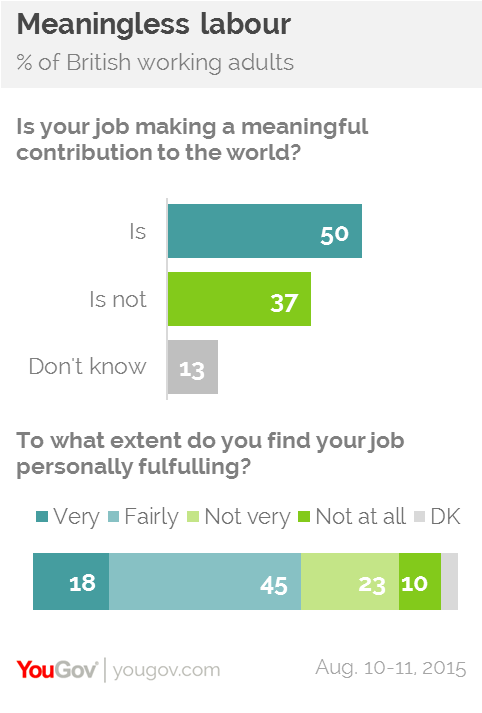
Meanwhile, the more sober-suited Harvard Business review adds: “Stress Can Be a Good Thing If You Know How to Use It”, which concludes:
As society we largely fail to frame stress as potentially enhancing and often miss opportunities to learn from and grow from stressful moments. That does not mean that we advocate viewing all stressors as a positive thing; but we do advocate that you embrace your stress response as a powerful tool for helping you overcome the inevitable challenges in life that can—and will—arise.
So is work ‘meanginless’ and ‘stressful’ for many of us?
The challenge, for the individual, may be in feeling sufficiently in control of where they are now in relation to their short- and longer-term goals. To be mindful, too, of the limits of what they can do, and what they want to do. To be clear about ‘what’s next?’ Where do you really want to be, & when?
If these are the kind of questions you’re asking, then drop me a line at nick@box5878.temp.domains so you can determine ‘what’s next?’ for you.
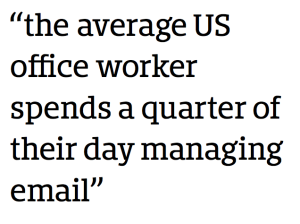
Click here to read my full review of Michael Harris’ ‘The End of Absence‘ – a smart, funny and timely meditation on the differences wrought by digital on how we live and work today, and a world remembered “by those born before 1985, before the surfacing of the Internet.”
© 2022 Nick Wray Coaching. All rights reserved.


